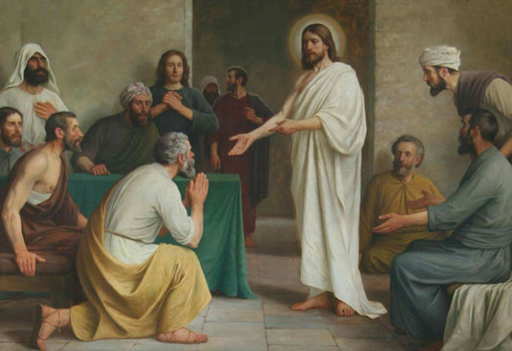Reflections on the GOSPEL. Creation, fall, redemption, restoration /consummation /recreation. Inclusive and exclusive. Tabernacle and presence.
Loved by God.

- UBF Gospel Musings
- Chicago, IL, United States
- * It's good to suffer loss, for it draws me to the Cross where God's loss is more than what anyone ever lost. * We cannot hear what the stories of the Bible are saying until we hear them as stories about ourselves. * Let go of control. * Trust God. Thank God. Think about God. Talk to God. Talk about God.
Showing posts with label resurrection. Show all posts
Showing posts with label resurrection. Show all posts
Saturday, April 15, 2023
Agents of Divine Mercy - Bishop Barron Sunday Sermon
Labels:
Barron,
john,
resurrection
Thursday, April 6, 2023
Hope in Times of Fear: The Resurrection, Tim Keller, 2021
- Why is it that "my head believes," but "my heart is not moved"?
Only in the cross is divinity and humanity reconciled. With the church there will always be attrition and retention.
- What is the difference between relative hope in human agency and infallible hope in God? 210-211.
- Christian hope means that I stop betting my life and happiness on human agency and rest in God alone.
- If you know--and keep remembering--that resurrection happened and is coming, you won't ever be in utter darkness. 215-216. Epilogue (Ps 118:22-23).
Saturday, April 1, 2023
All the Way Down (Philippians 2:6-11) Palm Sunday Sermon 4/2/2023
Labels:
Barron.Philippians,
resurrection
Sunday, October 16, 2022
Healing and Refreshment (Acts 3)
“Whoever confesses his sins … is already working with God. God indicts your sins; if you also indict them, you are joined with God. Man and sinner are, so to speak, two realities: when you hear ‘man’ – this is what God has made; when you hear ‘sinner’ – this is what man himself has made. Destroy what you have made, so that God may save what he has made … When you begin to abhor what you have made, it is then that your good works are beginning, since you are accusing yourself of your evil works. The beginning of good works is the confession of evil works. You do the truth and come to the light.”—The Catechism of the Catholic Church.
Acts 3-7 describes the life and increase of the early church in Jerusalem (Ac 1:8a), and the simultaneous opposition to it from the Jewish religious leaders. Acts 3-4 is a drama in 3 parts:
- The mighty work (3:1-10). Healing of a man lame from birth.
- The mighty word (3:11-26). Peter preaches to the crowd his temple sermon, his 2nd sermon.
- The mighty ones (4:1-21). The bold, brave courageous and ordinary apostles on trial.
- What can you learn about prayer from Peter and John (Ac 3:1; 2:42; 4:24; Lk 18:1; Mk 1:35)?
- How have they changed (Mt 18:1; Mk 9:34; Lk 9:46)?
- [The temple hours of prayer were set at the 3rd, 6th and 9th hours.] Can you pray 3 times a day (Ps 55:17; Dan 6:10).
- What was the strategy of the lame man and/or those who "carried" and "put" him daily at the temple (Ac 3:2-3)?
- Putting yourself in the place of the beggar (Ac 4:22), how would you have felt about your life?
- Why did Peter say, "Look at us!" (Ac 3:4)?
- Do you feel comfortable looking at and asking beggars to look at you? What was the beggar expecting (Ac 3:5)?
- Did Peter have "silver and gold" (Ac 3:6; 2:45)?
- What is the value of "the name of Jesus" (Ac 3:6, 16; 4:10)?
- Whose faith healed the lame man (Lk 5:20; Mt 9:22 Mk 5:34; 10:52; Lk 8:48; 18:42)?
- How do you respond when others ask for help? What do you have to give them?
- What has Peter and John experienced over the past 60 days that has changed them?
- How quickly was the lame man healed (Ac 3:7)? What did he do (Ac 3:8)?
- What similarities do we all share with this lame man (Ac 3:2; Gen 8:21; Ps 51:5; Rom 3:23; Eph 2:8-9; Ac 1:8; Rom 1:16)?
- How did the people respond (Ac 3:9-11; 2:22, 43)? To whom did the crowd attribute the miracle (Ac 3:12)?
- When God blessed and used Peter to perform such a great miracle what temptation is there for him (Dt 9:4-6)?
- Does church leadership draw attention to the leader or to their particular church? Is the leader holier, better, closer to God and with superior powers that others do not have access to?
- Could God use you to be part of a miracle? Why or why not?
- Why did Peter connect Jesus with Abraham, Isaac and Jacob (Ac 3:13a)?
- What did Peter accuse the Jews of doing (Ac 3:13-15; 2:23, 36; 4:10)? Is this a justification for anti-Semitism? Was it only the Jews who had Jesus killed? Are you responsible for the death of Christ? Do you speak boldly against sin? What did God do (Ac 3:15b)?
- In serving God, do you do so "by faith in the name of Jesus" (Ac 3:16), OR do you depend on your good intentions, your gifts and talents, your money, your zeal and passion, your past experience, you position of authority, etc?
- Why did Peter say that the Jews and their leaders were ignorant in killing Jesus (Ac 3:17; Lk 23:34)? Are there not then consequences? Are they then not responsible?
- Who had foretold that the "Messiah would suffer" (Ac 3:18)?
- What 4 successive blessings follow when you repent (Ac 3:19-21, 26)?
- What does it mean to repent (Ac 2:38; Mk 1:15)? Is it to feel sorry and feel bad about your sins? Is it mainly about self-improvement? Doing better? Do only non-Christians need to repent? What about Christians (Rev 2:4-5, 16, 21-22; 3:3, 19)?
- Are you confident that you have "turned to God" [be converted]?
- Can you explain refreshment that follow repentance: rest, respite, relief, restoration, regeneration, renewal (Mt 11:28; Jn 14:27; Phil 4:7)?
What did Peter conclude with prophecies from Moses, Samuel and Abraham (Ac 3:22-25; Dt 18:15-16, 19; 2 Sam 7:12; Gen 12:3; 18:18; 17:4; 22:18; 26:4; 28:14)?
www.westloop-church.org/index.php/messages/new-testament/43-acts-messages/689-acts-3
Labels:
Acts,
cross,
death,
repentance,
resurrection
Wednesday, September 28, 2022
The Gospel in 5 (Double) Truths (Luke 24:44-49)
In Luke's version of the Great Commission, the risen Lord summarizes the gospel in 5 truths:
- The double event: the death and resurrection of the Messiah (Lk 24:46).
- The double proclamation: forgiveness [the gospel offer] and repentance [the gospel demand] (Lk 24:47a).
- The double scope: "to all nations, beginning at Jerusalem" (Lk 24:47b).
- The double attestation/accreditation: the OT witness (Lk 24:44, 46) the NT witness (Lk 24:48).
- The double mission. The Great Commission involved a double sending: the sending to them of the Holy Spirit (Lk 24:48) and the sending of them into the world (Lk 24:47, 49). The 2 missions go together, for the Holy Spirit is a missionary Spirit.
Jesus has given us a beautifully balanced and comprehensive account of the gospel. We are commissioned to
- proclaim repentance and forgiveness (Lk 24:47) on the basis of him who died and was raised (Lk 24:46),
- to all humankind [Gentiles and Jews] (Lk 24:47b),
- according to the Scriptures [OT, NT] (Lk 24:44, 46, 48),
- in the power of the Spirit given to us (Lk 24:49).
The Truths of the Death and Resurrection of Christ (1 Cor 15:3-4) are:
- Central truths--of 1st importance.
- Historical truths, not myths.
- Physical truths: 4 events are physical: death, burial, resurrection and appearances.
- Biblical truths--according to the Scriptures.
- Theological truths--events of huge significance. We deserve to die for our sins, but Christ died our death instead of us. How great is his love!
Reference: John Stott, Through the Bible Through the Year. Daily Reflections from Genesis to Revelation. 2006.
Labels:
death,
Luke,
resurrection
Monday, April 6, 2020
Resurrection in the Face of Death (John 11)
- Do you truly believe in the resurrection in the face of death, such as from Covid-19?
- Is your faith in the resurrection theoretical or practical? Rooted in theology or reality?
- What do you do when there is the (probable, possible, potential, problematic) palpable panic from the pandemic?
"...whoever lives by believing in me will never die. Do you believe this?" (John 11:26)
- Do Christians who are familiar with John 11 think of this famous story positively as victory over death?
- When we consider those around dead Lazarus at Bethany, were they positive and victorious [or negative and wailing] after they heard Jesus' words of being the Resurrection and the Life (Jn 11:25)?
- What is the implication of Mary and Martha's urgent message to Jesus (Jn 11:3)?
- What does Jesus' response show us about his priority (Jn 11:4, 40)? What is your priority in the time of grave illness?
- How is Jesus' love for Mary and Martha (Jn 11:5) expressed (Jn 11:6)? Is this how you would have responded to someone you love?
- Why did the disciples caution Jesus about returning to Judea (Jn 11:7-8)? What does this show about their main concern? How about you? What does Jesus' answer teach us about our life and death (Jn 11:9-10)?
- How did the disciples misunderstand Jesus (Jn 11:11-14)? Why was Jesus glad that Lazarus had died (Jn 11:15)? What was his primary concern? Your primary concern? What does Thomas' response show about him (Jn 11:16)?
- What was Martha [and later Mary] implying by her statement upon seeing Jesus (Jn 11:21, 32)? What did Martha "know" (Jn 11:22-24)?
- Do you experience life and that you will never die...when you are dying or your loved one is dying (Jn 11:26)? What did Jesus want Martha to believe (Jn 11:25-26)? Did she (Jn 11:27)?
- Why was Jesus deeply moved/angry (Jn 11:33)? Why did he weep (Jn 11:35)? How did the Jews interpret it (Jn 11:36-37)? How were they both right and wrong?
- What did Jesus want Martha [and us] to believe and see (Jn 11:40)? What is the disconnect between what she knew and believed (Jn 11:22, 24, 27, 39)? Will you have such a disconnect when death hits home?
- Is there a "downside" to Lazarus being raised from the dead (Jn 11:13, 17, 44)?
Labels:
Hauerwas,
john,
resurrection
Tuesday, April 5, 2011
18) The Beginning (Mark 15:37-16:7)
"If you can't dance and you long to dance, in the resurrection you'll dance perfectly. If you're lonely, in the resurrection you will have perfect love. If you're empty, in the resurrection you will be fully satisfied." 223
Intro: In every messianic movement in Israel, the messianic leader was killed and the movement collapsed. But after Jesus' death, Christianity spread through the entire Roman empire in 300 years. What caused the explosive growth in Christianity after its founder's death?
Labels:
mark,
resurrection,
timkeller
Subscribe to:
Posts (Atom)




